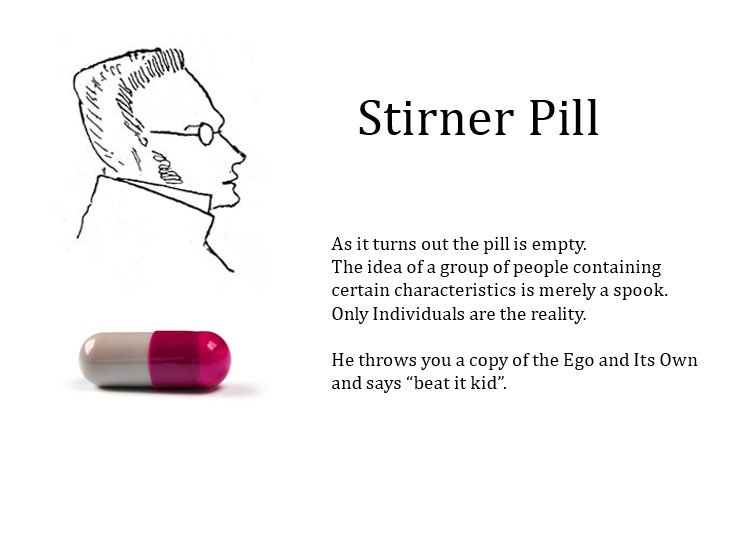Morals don't naturally exist, they are created. Morals are a tool, a means.
Virtual Cafe Awards









This thread has been viewed 6503 times.
Math doesn't naturally exist, and had to be created by humans as a tool. That doesn't mean it's subjective though.Morals don't naturally exist, they are created. Morals are a tool, a means.
isnt it in-built?
- If morality were a human construct we should be able to change it, but just as we cannot change logic or uncook an egg, a society cannot survive which values lies or adultery.
UNION OF EGOISTS REPRESENTI'll shoot the morals in the face.
View attachment 82952
I guess I could be considered an Egoist. I don't really care about soyciety I just want to do the stuff I think is correctUNION OF EGOISTS REPRESENT




I'm not a moral relativist or anything, but a lot of these arguments have easy answers.Coming back to review this topic and I see that the poll is perfectly divided.
Here are some additional thoughts on the issue that should be considered:
- "Just as our sense experience convinces us that reality exists, our moral experience convinces us that moral values are objectively real"
The Is-Ought gap is a well-known philosophical proof that logic and reason can never take you from a list of "is statements" (describing the way the world is) to "ought statements" (telling people what they should do). For example, consider the argument
- Why should we expect moral values to be anything but objective when logic, laws of nature, and reality itself is objective. In the same way that we could line every person up in order of height, strength, intelligence, (and less testable) ambition, love, compassion, joy, peacefullness. I think we could line humanity up in order of adherence to moral law with some argument between people but agreement between the ends.
A lot of things that most people would consider immoral would hypothetically lead to prosperity and long-term benefits. Eugenics and forced-sterilization are a good example. It would lead to curing genetic disabilities, but we choose not to implement it, because it would be immoral now, in the short-term.
- Morality leads to prosperity and peace and long-term benefits (or to death but that's due to immoral circumstances).
This is true, but people also disagree on the best color and the best movie. Both of which most people would agree are subjective.
- Just because people disagree does not mean it's not objective - people disagree on mass of moon and whether the kuiper belt exists, there is clearly an objective answer to this.
Morality has changed, pretty significantly over the years. Aristotle infamously defended slavery. The word "sinister" comes from a word meaning "left handed" because people used to think it was morally wrong to be left handed.
- If morality were a human construct we should be able to change it, but just as we cannot change logic or uncook an egg, a society cannot survive which values lies or adultery.
- "A man who says it is morally okay to rape children is just as wrong as the person who says 2+2=5"
Well said. I don't think we can even say that movies are subjective though. People will prefer different movies but a porn-rape-flick (idk) is objectivly worse than lets say Star Wars: A New Hope if morality is objective, right? Or maybe a movie that conveys less information (due to damage, lack of focus, or low resolution) is lesser than a movie which does not do these things.I'm not a moral relativist or anything, but a lot of these arguments have easy answers.
The Is-Ought gap is a well-known philosophical proof that logic and reason can never take you from a list of "is statements" (describing the way the world is) to "ought statements" (telling people what they should do). For example, consider the argument
1) Your shirt is on fire
2) There is a lake nearby
3) Jumping in the lake is the quickest way to put out the fire
therefore
4) You should jump in the lake.
Technically, this is not a sufficient argument. You need another premise "Your shirt shouldn't be on fire" for the argument to work. Most people share a lot of premises about what should be, (you shouldn't starve, you shouldn't hurt people, you shouldn't steal, etc) so arguments like this work just fine for normal conversation. But, if you encounter someone with a totally alien set of "should" assumptions, you'll never be able to convince them using only "is" statements.
A lot of things that most people would consider immoral would hypothetically lead to prosperity and long-term benefits. Eugenics and forced-sterilization are a good example. It would lead to curing genetic disabilities, but we choose not to implement it, because it would be immoral now, in the short-term.
This is true, but people also disagree on the best color and the best movie. Both of which most people would agree are subjective.
Morality has changed, pretty significantly over the years. Aristotle infamously defended slavery. The word "sinister" comes from a word meaning "left handed" because people used to think it was morally wrong to be left handed.
Arithmetic is also founded on axioms, which we merely decree to be true. We assume zero is a number, and that equality is reflexive, and then show that under these assumptions, 2 + 2 is in fact equal to 4. This only works under the axioms we stipulate though, and those axioms have changed over time. The introduction of 0 is a perfect example.
Now, here's the part where I say child abuse is bad. In mathematics, we pick axioms that make our system line up with reality as closely as possible. So, we might take two boxes, stack them on top of eachother, and see that the new height is twice the height each individual box. Then we'll decide that whatever axioms we choose to base mathematics off of, if it doesn't come to the conclusion that 1 + 1 is 2, then it won't be very useful to us. You can do a similar thing with ethics, but "useful to us" is ahrder to demonstrate in that field. Most people agree on simple cases, earlier you mentioned that lying is wrong. But when really pushed about it, they often don't hold to those convictions. Is letting kids believe in Santa wrong? It's a lie. If someone's child dies in a horribly slow and painful way, would it be immoral for the emt to lie to the parents and say it was a quick death?
Proving that your moral system is objectively true is an uphill battle, and lots of very smart people are trying to prove that different systems are objectively correct.
